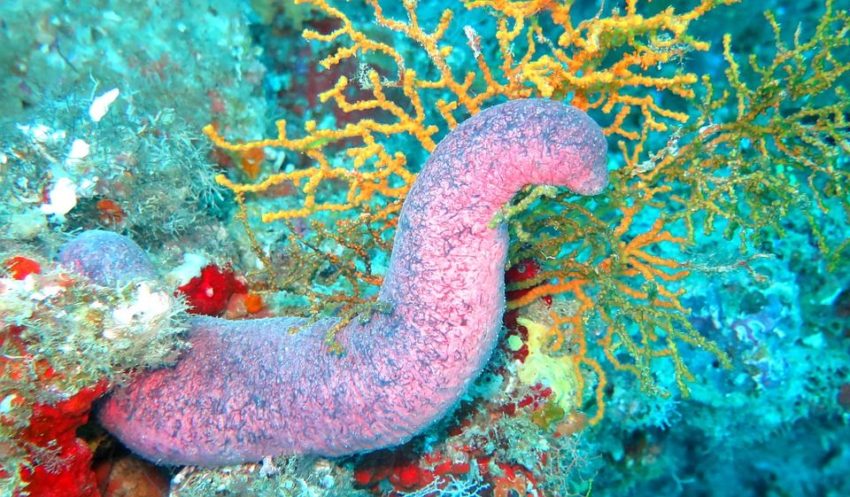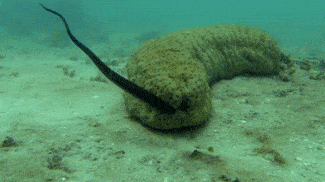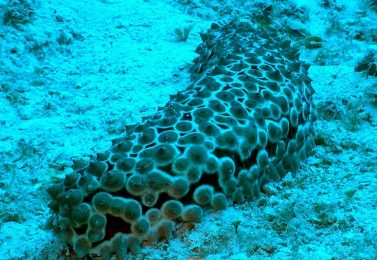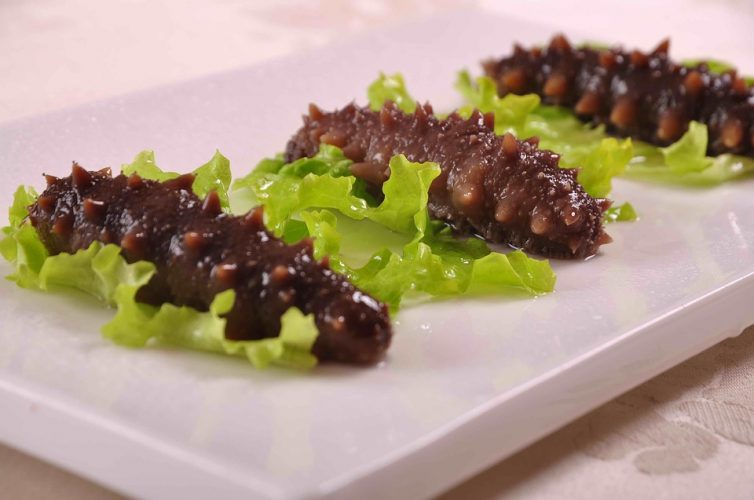Sea Cucumber Alternative Cancer Treatment: Your Complete Guide

The ancient Chinese medicine sea cucumber has potent anti-cancer and pro-metabolic effects in animals and in people, without causing any harm or side effects. Whether you wish to treat cancer or other symptoms and diseases, in this article, you'll learn the science behind sea cucumber medicine, and where to obtain some so you can begin healing today.

Sea cucumbers are squishy, boneless saltwater creatures found on the bottom of oceans worldwide, whose bodies are shaped like cucumbers and wrapped in a soft, leather-like casing.
Sea cucumbers offer an array of uniquely medicinal substances which are proven effective against cancer and other diseases. Seaweeds such as kombu, limu and mozuku also contain many of these rare medicines as well as algae, sea urchins, and sea snails. In many asian countries, sea cucumber is considered a delicacy.
There are around 1,250 different species of sea cucumber, and National Geographic informs us that they feed on “tiny particles like algae, minute aquatic animals, or waste materials, which they gather in with 8 to 30 tube feet that look like tentacles surrounding their mouths.” When threatened, certain types shoot sticky white threads at predators to entangle and confuse them, and others, in a sharp blast of fierce muscular contraction, discharge their internal organs out of their anus, like a form of Jujitsu or other martial arts for ocean creatures used for self defense purposes. Any body parts missing from the quarrel are quickly regenerated.1
Sea cucumbers are select food sources for fish, crabs and other marine life and are considered a delicacy by humans in Asian countries. They are a source of antibacterial, anti-inflammatory, and anticancer compounds2 that have been used to treat cancer in traditional Chinese medicine for hundreds of years.3 Modern research has found that sea cucumber can relieve joint pain and other symptoms of arthritis4, and a report published in the Journal or oral science in 2003 even showed that toothpaste made with sea cucumber extract was effective at treating gum disease.5
TABLE OF CONTENTS
Cancer Success Stories Using Sea Cucumber
 In 1991, New York author and entrepreneur Walter Levine was diagnosed with multiple myeloma, mylanoma, and bladder cancers. After almost a year of conventional treatments, amounting to more than $440,000 in medical bills, his condition worsened. Walter's doctor told him that over 90% of his body had cancer, and said hopelessly, “I’m afraid there’s nothing more we can do.”
In 1991, New York author and entrepreneur Walter Levine was diagnosed with multiple myeloma, mylanoma, and bladder cancers. After almost a year of conventional treatments, amounting to more than $440,000 in medical bills, his condition worsened. Walter's doctor told him that over 90% of his body had cancer, and said hopelessly, “I’m afraid there’s nothing more we can do.”
Walter’s response was priceless…
I looked him in the eye and very slowly and firmly said, Listen, I’m going to ask every person I know to help me hunt down the right doctor and the right treatment for me. I hope to God there’s someone out there who can help me, and if I find out that there is someone somewhere who could’ve made a difference and you’re not telling me, you can bet that I will come back here and take you with me.
The doctor immediately picked up the telephone and arranged for Walter to have a stem cell transplant from the top doctor at Arkansas Cancer Research Center. Following his transplant, a friend brought Walter two boxes of sea cucumber and made him promise to “take two everyday”. Skeptical, but willing to try anything at this point, Walter began the treatment. In just days he noticed that his symptoms were improving, and they continued to improve over the coarse of the next year as he self-administered the treatment. Doctor’s tests confirmed what Walter had been feeling - his cancer was in remission. Walter is now cancer free and has remained that way for 20 years until the present day.6
Sea Cucumber vs. Cancer Scientific Research

A sea cucumber on a sandy bottom off the south coast of St. Croix in the U.S. Virgin Islands, 2015.
Sea cucumber has shown selective toxicity towards cancer cells while maintaining health in normal functioning cells. A number of properties of the sea cucumber could be responsible for this effect. It is likely that a synergy between the many therapeutic substances found within the sea cucumber is at play.
Medicinals that we will explore in this section include powdered sea cucumber, fucoidan, frondoside A, triterpene glycosides, frondanol A5, and a few others.
Powdered Sea Cucumber Cancer Treatment
The advantage of using powdered sea cucumber as medicine is that it contains all substances that have ever been discovered and proven effective, as well as potentially many more that have yet to be discovered. The question is - is powdered sea cucumber potent enough to have therapeutic value against cancer? In my review of the research, I found one study which used powdered sea cucumber to treat cancer, and that study brought forth great promise that it can. In just 10 days, tumor weights in animals treated with powdered sea cucumber were “remarkably decreased” 1.
- 1. In a study from Shandong University in Jinan, China in 2008, researchers examined the effect of freeze-dried sea cucumber powder on tumor-bearing mice. After feeding the mice sea cucumber powder for 10 days, “the weights of tumor were declined and the inhibition rates of tumor were remarkably decreased in the treated groups.” Enhanced immune system function was also observed. (Wei, et al., 2008) http://www.ncbi.nlm.nih.gov/pubmed/18421858
8 Studies Show Fucoidan Can Treat Cancer
The sea cucumber extract Fucoidan has a superb resume. It has been found to trigger cell death in prostate cancer cells1, two types of colon cancer cells2, lung cancer cells and skin cancer cells3 in vitro. In two separate studies in vivo, Fucoidan triggered apoptosis in mouse breast cancer cells and in mice induced with breast cancer4,5. Also in cancer-induced mice, Fucoidan enhanced immune system function3 and inhibited the spread of liver cancer6. Fucoidan has been demonstrated to enhance the cancer-killing effect of toxic chemotherapy drugs7 and one of the most incredible findings was that Fucoidan “markedly reversed” intestinal damage caused by the highly toxic and insidious chemotherapy treatment.8
- 1. In a study from Jeju National University in 2013, Korean scientists applied Fucoidan to prostate cancer cells and observed it cause cancer cell death (apoptosis).
http://www.ncbi.nlm.nih.gov/pubmed/23966032 - 2. Two types of colon cancer cells were treated with Fucoidan in a study by Korean researchers at Hallym University in 2010. After various concentrations of Fucoidan were added to colon cancer cell cultures, substantial reductions in cancer cell numbers were observed. Experimenters confirmed that “fucoidan induces apoptosis in HT-29 and HCT116 human colon cancer cells.”
http://www.ncbi.nlm.nih.gov/pmc/articles/PMC2931458 - 3. Scientists from the Technical University of Denmark conducted a 2011 study investigating the influence of Fucoidan on lung and skin cancer cells (in vitro) and in mice (in vivo). Fucoidan induced apoptosis in the cancer cells, and boosted the immune systems of mice, as evidenced by an increase in natural killer cell activity. “This study provides substantial indications that crude fucoidan exerts bioactive effects on lung and skin cancer model cells in vitro and induces enhanced natural killer cell activity in mice in vivo,” concluded researchers.
http://www.ncbi.nlm.nih.gov/pubmed/21624396 - 4. In 2012, Chinese researchers tested the effects of Fucoidan on mouse breast cancer cells and in mice with breast cancer. In cell cultures, Fucoidan triggered apoptosis and “significantly decreased” the amount of cancer cells. Researchers concluded that crude Fucoidan “may serve as a potential therapeutic agent for breast cancer.”
http://www.ncbi.nlm.nih.gov/pmc/articles/PMC3423341 - 5. A team of Chinese researchers exposed mouse breast cancer cells to Fucoidan in a 2013 study and discovered that “fucoidan significantly inhibited cell growth” and “increased cell death.” Injection of fucoidan in tumor-bearing mice "reduced the tumor volume and weight”.
http://www.ncbi.nlm.nih.gov/pubmed/23530646 - 6. In 2013, a study from Tianjin Medical University Cancer Institute and Hospital in Tianjin, China, found that Fucoidan “significantly inhibited the tumor growth” in cancer-induced mice.
http://www.ncbi.nlm.nih.gov/pubmed/23737842 - 7. At Kyushu University in Japan a study was conducted to determine if Fucoidan could improve the effectiveness of chemotherapy treatment. Tested on two types of human breast cancer cells, Fucoidan administered in combination with chemotherapy drugs was found to retard cancer cell growth in some cells and induce cancer cell death in others.
http://www.ncbi.nlm.nih.gov/pubmed/23303302 - 8. Scientists from Ocean University, China induced painful inflammation and ulceration (intestinal mucositis) in rats by administering a chemotherapy drug then treated them with Fucoidan to assess its protective effects. Oral administration of fucoidan “markedly reversed” chemotherapy-induced damage in the mice and researchers stated that “Sea cucumber fucoidan may be used as a potential food supplement to prevent chemotherapeutic mucositis.”
http://www.ncbi.nlm.nih.gov/pubmed/25407449

In many Asian countries, sea cucumber is considered a delicacy.
Triterpene Glycosides: 11 Studies Showing Powerful Cancer Treatment Potential
Triterpene Glycosides - a family of substances found in the sea cucumber - impart their therapeutic effects by halting the replication of DNA inside cancer cells and by activating enzymes that trigger cancer cell death via apoptosis1.
Numerous Triterpene Glycosides found in the sea cucumber have demonstrated anti-cancer effects in vitro, including:
- Holothurin A3 and Holothurin A4 both triggered apoptosis in mouth and liver cancer cells2
- Intercedenside B triggered apoptosis in stomach and colon cancer cells3
- Stichoposide C triggered apoptosis in leukemia and colon cancer cells4
- Echinoside A and DS-echinoside A triggered apoptosis in human and mouse liver cancer cells5
- Colochiroside A triggered cell death in 6 types of tumor cells6
- Scabraside A and Scabraside B triggered apoptosis in four types of human tumor cells7
- Philinopside A “manifested strong anti-tumor activities both in vitro and in vivo.”8
- Philinopside E and Philinopside F triggered apoptosis in ten types of cancer cells9
- Intercedensides A, Intercedensides B, and Intercedensides C triggered apoptosis in ten types of human tumor cells10
- And seven other sea cucumber extracts triggered apoptosis in five types of cancer cells11
In animal models, certain Triterpene Glycosides have been found to markedly reduce tumor growth in rats4, including Stichoposide C, which shrank tumors by 55%5. Also found was significantly reduced tumor growth in mice with lung and connective tissue cancers11 and inhibition of cancer growth in mice with liver and connective tissue cancers10. In rat aorta’s and chick embryo’s, sea cucumber extract Philinopside A was found to suppress the formation of new blood vessels (angiogenesis) necessary for cancer development, while simultaneously sparking cancer cell death in cancer-induced rats8.
- 1. In a Russian review of the anti-cancer effects of triterpene glycosides, specific mechanisms behind their apoptotic effects were illucidated. Activating enzymes responsible for initiating cell death and halting replication of genetic information were among two of them.
http://www.ncbi.nlm.nih.gov/pubmed/25756523 - 2. A study from the Vietnamese Academy of Science and Technology in 2007 tested the effects of two novel compounds from the sea cucumber on two different types of cancer cells. Both compounds – Holothurin A3 and Holothurin A4 - were discovered to be “strongly cytotoxic to both cancer cell lines”.
http://www.ncbi.nlm.nih.gov/pubmed/18087805 - 3. Researchers isolated two substances from sea cucumber and tested their effects on cancer cells in a study from Shanghai, China in 2007. Both Intercedenside B and an unnamed substance “exhibited significant cytotoxicity” against stomach and colon cancer cells.
http://www.ncbi.nlm.nih.gov/pubmed/17493770 - 4. In 2012, South Korean researchers examined the effects of sea cucumber extract Stichoposide C on leukemia and colon cancer cells and in mouse models. The extract induced apoptosis in the cancer cell lines and "markedly reduced tumor growth" in rats.
http://www.ncbi.nlm.nih.gov/pubmed/23132899 - 5. At Ocean University, China, researchers tested two sea cucumber extracts on human liver cancer cells and in mice with liver cancer. Both Echinoside A and ds-echinoside A exhibited "marked anti-cancer activity” in human cancer cells and “reduced the tumor weight [in mice] by 49.8% and 55.0%, respectively.”
http://www.ncbi.nlm.nih.gov/pubmed/22012678 - 6. Chinese researchers tested the anti-tumor activities of sea cucumber extract Colochiroside A on both cell cultures and in mice. The substance “exhibited significant cytotoxic activity against 6 types [of] cultured tumor cell lines”, and “exhibited high inhibiting activity” in mice with liver and connective tissue cancers. Researchers concluded the cancer-growth inhibiting effects of sea cucumber extract Colochiroside A were “remarkable” both in vivo and in vitro.
http://www.ncbi.nlm.nih.gov/pubmed/21598553 - 7. In a 2009 study researchers isolated two new compounds from the sea cucumber and tested their effects against cancer. Scabraside A and Scabraside B both “had significant in vitro cytotoxicity against four human tumor cell lines”.
http://www.ncbi.nlm.nih.gov/pubmed/19598081 - 8. In 2005, researchers from the Chinese Academy of Sciences in China assessed the effects of sea cucumber extract Philinopside A on tumor growth and observed it manifest “strong anti-tumor activities both in vitro and in vivo.” Their results stated "Philinopside A is a promising anti-cancer agent that possesses dual cytotoxic and anti-angiogenic effects.”
http://www.ncbi.nlm.nih.gov/pubmed/15645493 - 9. After two novel extracts were isolated from the sea cucumber - Philinopside E and Philinopside F - and applied to cancer cells, scientists discovered that Philinopside E expressed “significant cytotoxicity” to ten different types of cancer cells.
http://www.ncbi.nlm.nih.gov/pubmed/16644536 - 10. When Intercedensides A, Intercedensides B and Intercedensides C were extracted from the sea cucumber in 2003, all three substances “showed significant cytotoxicity against 10 human tumor cell lines”. Additionally, Intercedensides A significantly slowed tumor growth in mice with lung and connective tissue cancers.
http://www.ncbi.nlm.nih.gov/pubmed/12932123 - 11. In a 2015 study from the Vietnam Academy of Science and Technology, seven substances were isolated from the sea cucumber and their cytotoxic effects were evaluated. All seven compounds “showed potent cytotoxicity on five tested cancer cell lines.”
http://www.ncbi.nlm.nih.gov/pubmed/26099533
5 Studies Using Frondoside A to Treat Cancer
Scientific investigations have confirmed that Frondoside A can trigger apoptosis in leukemia cells1, skin cancer cells, breast cancer cells, liver cancer cells and three types of lung cancer cells.2 In rat models, it has been shown to inhibit the growth and spread of multiple types of tumors2,4,5. It can also synergistically enhance the effects of chemotherapy drugs3. While chemotherapy destroys all cells in its path - cancerous or not - Frondoside A selectively targets cancer cells “without any obvious side effects”2. Furthering the case for the safety of Frondoside A, another study found that it decreased tumor growth in mice “without manifest toxic side-effects.”5
- 1. A group of Korean scientists studied the effects of Frondoside A and Frondoside A(2)-2 on cancer cells in 2009. Their results indicated that “Both Frondoside A and A(2)-2 strongly induced apoptosis of leukemic cells” and “Frondoside A-induced apoptosis was more potent and rapid than A(2)-2-induced apoptosis.”
http://www.ncbi.nlm.nih.gov/pubmed/19162021 - 2. Cancer cells and lung tumor-bearing mice were treated with Frondoside A by a group of scientists at United Arab Emirates University in 2013. Frondoside A triggered apoptosis in skin cancer cells, breast cancer cells, liver cancer cells and 3 types of lung cancer cells. In tumor-bearing mice the growth and spread of cancer was inhibited without any obvious side effects. They also found that treating lung tumors with Frondoside A, in addition to chemotherapy agent Cisplatin, “enhanced the inhibition of lung tumor growth.”
http://www.ncbi.nlm.nih.gov/pubmed/23308143 - 3. Swedish researchers performed a study in 2014 to find out if Frondoside A could enhance the ability of chemotherapy drug gemcitabine in the treatment of pancreatic cancer. While rapid tumor growth was observed in placebo-treated animals, “Tumor growth was significantly reduced in all treatment groups.” The study concluded that “gemcitabine, combined with Frondoside A was significantly more effective than with either drug alone.”
http://www.ncbi.nlm.nih.gov/pubmed/24462376 - 4. In 2012, researchers from the University of Maryland Greenebaum Cancer Center in Baltimore, Maryland used Frondoside A on mice with induced breast tumors. Frondoside A “inhibits spontaneous tumor metastasis to the lungs,” they wrote, and concluded that “these studies add to the growing body of evidence that Frondoside A may be a promising new agent with potential to treat cancer.”
http://www.ncbi.nlm.nih.gov/pubmed/21761157 - 5. In a study from United Arab Emirates University in 2011, scientists evaluated the effects of Frondoside A on human breast cancer cells and breast tumor-bearing mice. Among a host of observed anti-cancer effects, Frondoside A induced apoptosis in the breast cancer cells in vitro and tumor growth in the tumor-bearing mice was strongly decreased “without manifest toxic side-effects.” Additionally, they discovered that combining Frondoside A with chemotherapy drug paclitaxel enhanced the killing of breast cancer cells.
http://www.ncbi.nlm.nih.gov/pubmed/21741966
Frondanol A5: Sea Cucumber Extract for Cancer
Another exciting medicinal found in the sea cucumber - Frondanol A5 - has been shown to successfully provoke cell death in two types of pancreatic cancer.1 Scientists have also observed it enhance immune systems and inhibit tumor growth in mice2. Remarkably, after poisoning rats with a chemical used to induce colon cancer, investigators fed them a diet containing Frondanol A5 and it completely prevented colon cancer from developing3.
- 1. Sea cucumber extract Frondanol A5 was tested on two types of human pancreatic cancer cells in a 2010 study from the Feinberg School of Medicine in Chicago. “Frondanol-A5 causes cell cycle arrest and apoptosis in human pancreatic cancer cells,” concluded researchers, who further noted that sea cucumber “may be valuable for nutritional therapy or prevention of pancreatic cancer.”
http://www.ncbi.nlm.nih.gov/pubmed/20124937 - 2. In 2015, researchers from the University of Oklahoma Health Sciences Center fed sea cucumber extract Frondanol A5 to mice for 14 weeks and assessed intestinal tumor inhibition. Frondanol A5 enhanced the immune system and inhibited tumor growth in the mice. Researchers concluded that “Frondanol A5 exhibits significant chemopreventive potential against intestinal tumorigenesis.”
http://www.ncbi.nlm.nih.gov/pubmed/25657017 - 3. In a study from 2010, experimenters examined the colon cancer-preventive properties of sea cucumber extract Frondanol A5 in vivo and in vitro. After inducing cancer by feeding rats azoxymethane, they were fed diets containing various amounts of Frondanol A5 for 8 weeks and examined. Scientists found the dietary Frondanol A5 “significantly suppressed” growth of abnormal cells in the colon, and showed “growth inhibition” and “significant apoptosis” in human colon cancer cells.
http://www.ncbi.nlm.nih.gov/pubmed/20051375
Other Sea Cucumber Extracts Against Cancer
When Malaysian scientists explored extracts from two different sea cucumbers in 2013, they observed strong antioxidant effects and witnessed lung and throat cancer cell death1. Chinese academics viewed four Glucocerebroside extracts inhibit the spread of colon cancer cells2, an extract called SJAMP trigger cancer death in liver cancer cells3 and a novel extract called PE trigger apoptosis in “several” tumor cell lines4. A water-based extract labelled ESC-AQ was found to have “profound anti-cancer activity” in vitro5. In animal models, SJAMP inhibited tumor growth6 and PE caused tumor cell death.4 SJAMP combined with the chemotherapy drug Fluorouracil rendered a synergistic effect in mice with liver tutors that resulted in a 62.73% reduction in tumor size6.
- 1. A study was conducted in 2013 by researchers from International Islamic University in Pahang, Malaysia to investigate the antioxidant and cytotoxic properties of extracts from two types of sea cucumber species. Tested on human lung and throat cancer cells, the results showed that both sea cucumber extracts had free-radical scavenging (antioxidant) effects, and were toxic to cancer cells.
http://www.ncbi.nlm.nih.gov/pubmed/23567827 - 2. Four different extracts from the sea cucumber were tested in vitro on the growth and spread of colon cancer cells in a 2013 study. Results from Ocean University, China indicated that all substances “exhibited an inhibitory effect on cell proliferation.”
http://www.ncbi.nlm.nih.gov/pubmed/23470440 - 3. In a study from Quingdao, China in 2010, the effects of a sea cucumber extract called SJAMP were tested on cultured liver cancer cells. The extract inhibited growth of the cancer cells by inducing cancer cell death and according to researchers, “provide a theoretical basis for the utilization of SJAMP as a potential antitumor component for the treatment of hepatocellular carcinoma.”
http://www.ncbi.nlm.nih.gov/pubmed/20051817 - 4. “Here, we examined the in vitro and in vivo anti-angiogenesis and anti-tumor activities of 'PE', a new marine-derived compound,” wrote scientists from the Chinese Academy of Sciences in their 2005 study. PE was found to prevent the formation of new blood vessels (anti-angiogenesis) in tumors and to cause tumor cell death (apoptosis) in vitro. In vivo, PE suppressed angiogenesis, inhibited growth and reduced tumor size by triggering cancer cell death in two types of cancer-induced mice.
http://www.ncbi.nlm.nih.gov/pubmed/16082187 - 5. Korean experimenters at Jeju National University evaluated sea cucumber extract for its effects on human leukemia cells in vitro. The sea cucumber extract expressed “profound anticancer activity”, and delivered “a strong cytotoxic effect against the human HL-60 leukaemia cell line.”
http://www.ncbi.nlm.nih.gov/pubmed/23561113 - 6. A team of researchers from China studied the anti-tumor effects of a sea cucumber extract SJAMP on tumor-bearing mice alone, and in combination with chemotherapy drug fluorouracil. After dividing the mice into 5 groups, they received various doses of the extract and fluorouracil. The results of the study signify an inhibition of liver tumor growth in mice with SJAMP alone and a synergistic effect when the two substances were used in combination in the highest dose - amounting to a 62.73% reduction in tumor size.
http://www.ncbi.nlm.nih.gov/pubmed/25199288
Where to Buy Sea Cucumber Powder or Other Sea Cucumber Extracts?
In the age of the internet, sea cucumber powder as well as many of the remarkable extracts found within the sea cucumber are readily obtainable to anybody who wants them. The following products I recommend because they contain very clean and high quality ingredients.
- Click to View: Sea Cucumber Powder
- Click to View: Fucoidan Extract
Be sure to reach out and let me know if you decide to use either one of them.
Conclusion
The sometimes-creepy yet fascinating saltwater creature known as the sea cucumber has shown enormous promise for the treatment of cancer in both scientific and anecdotal research.
A long list of extracts from the sea cucumber have been tested both in vitro and in vivo against cancer cell lines and in animals induced with cancer with great success.
One important question that remains to be answered is: Are one or more of the extracts from the sea cucumber the most potent medicines for cancer and other diseases in humans, or is the easy-to-produce and obtain sea cucumber powder itself the best medicine?
The story of Walter Lavigne has given us real-world evidence that sea cucumber powder could be its most medicinal form when it comes to treating cancer.
Whatever the case, sea cucumber represents a powerful and safe therapy which people diagnosed with cancer or other diseases might want to turn to as part of their protocol for healing.
If you found this article useful or entertaining in any way, please share it on social media with someone you love.
And if you haven't already, be sure to subscribe to our newsletter for more great information and updates on my work and progress.
References:
Introduction:
1. Sea Cucumbers, Sea Cucumber Pictures, Sea Cucumber Facts – National Geographic. [Online]. Available: http://animals.nationalgeographic.com/animals/invertebrates/sea-cucumber [February 24, 2016].
2. Janakiram, N.B., Mohammed, A., Bryant, T., Lightfoot, S., Collin, P. D., Steele, V. E., & Rao, C. V. (2015). Improved innate immune responses by Frondanol A5, a sea cucumber extract, prevent intestinal tumorigenesis. Cancer prevention research (Philadelphia, Pa.), 4, 327–337.
http://www.ncbi.nlm.nih.gov/pubmed/25657017
3. Zhu, C., Cao, R., Zhang, S. X., Man, Y. N., & Wu, X. Z. (2013). Fucoidan inhibits the growth of hepatocellular carcinoma independent of angiogenesis. Evidence-based complementary and alternative medicine : eCAM, , 692549.
http://www.ncbi.nlm.nih.gov/pubmed/23737842
4. Bordbar S, Anwar F, Saari N. High-value components and bioactives from sea cucumbers for functional foods–a review. Mar Drugs. 2011;9(10):1761-805.
http://www.ncbi.nlm.nih.gov/pmc/articles/PMC3210605/
5. Taiyeb-ali TB, Zainuddin SL, Swaminathan D, Yaacob H. Efficacy of ‘Gamadent’ toothpaste on the healing of gingival tissues: a preliminary report. J Oral Sci. 2003;45(3):153-9.
http://www.ncbi.nlm.nih.gov/pubmed/14650580
Sea Cucumber vs Cancer
Case Studies:
6. Levine, M. Walter. Finding Hope: The Fight of My Life. [Online]. Available: http://mwalterlevine.com/pages/mwl_thefight.htm [February 24, 2016]
Scientific Research:
Powdered Sea Cucumber:
1. Zhou X, Xu G, Shen B. Effect of freeze-dried sea cucumber powder of eastern sea on tumor and immune index of S180-bearing mouse. Wei Sheng Yan Jiu. 2008;37(1):30-2.
http://www.ncbi.nlm.nih.gov/pubmed/18421858
Fucoidan:
1. Boo HJ, Hong JY, Kim SC, et al. The anticancer effect of fucoidan in PC-3 prostate cancer cells. Mar Drugs. 2013;11(8):2982-99.
http://www.ncbi.nlm.nih.gov/pubmed/23966032
2. Kim EJ, Park SY, Lee JY, Park JH. Fucoidan present in brown algae induces apoptosis of human colon cancer cells. BMC Gastroenterol. 2010;10:96.
http://www.ncbi.nlm.nih.gov/pmc/articles/PMC2931458
3. Ale MT, Maruyama H, Tamauchi H, Mikkelsen JD, Meyer AS. Fucoidan from Sargassum sp. and Fucus vesiculosus reduces cell viability of lung carcinoma and melanoma cells in vitro and activates natural killer cells in mice in vivo. Int J Biol Macromol. 2011;49(3):331-6.
http://www.ncbi.nlm.nih.gov/pubmed/21624396
4. Xue M, Ge Y, Zhang J, et al. Anticancer properties and mechanisms of fucoidan on mouse breast cancer in vitro and in vivo. PLoS ONE. 2012;7(8):e43483.
http://www.ncbi.nlm.nih.gov/pmc/articles/PMC3423341
5. Xue M, Ge Y, Zhang J, et al. Fucoidan inhibited 4T1 mouse breast cancer cell growth in vivo and in vitro via downregulation of Wnt/β-catenin signaling. Nutr Cancer. 2013;65(3):460-8.
http://www.ncbi.nlm.nih.gov/pubmed/23530646
6. Zhu C, Cao R, Zhang SX, Man YN, Wu XZ. Fucoidan inhibits the growth of hepatocellular carcinoma independent of angiogenesis. Evid Based Complement Alternat Med. 2013;2013:692549.
http://www.ncbi.nlm.nih.gov/pubmed/23737842
7. Zhang Z, Teruya K, Yoshida T, Eto H, Shirahata S. Fucoidan extract enhances the anti-cancer activity of chemotherapeutic agents in MDA-MB-231 and MCF-7 breast cancer cells. Mar Drugs. 2013;11(1):81-98.
http://www.ncbi.nlm.nih.gov/pubmed/23303302
8. Zuo T, Li X, Chang Y, et al. Dietary fucoidan of Acaudina molpadioides and its enzymatically degraded fragments could prevent intestinal mucositis induced by chemotherapy in mice. Food Funct. 2015;6(2):415-22.
http://www.ncbi.nlm.nih.gov/pubmed/25407449
Triterpene Glycosides
1. Aminin DL, Menchinskaya ES, Pisliagin EA, Silchenko AS, Avilov SA, Kalinin VI. Anticancer activity of sea cucumber triterpene glycosides. Mar Drugs. 2015;13(3):1202-23.
http://www.ncbi.nlm.nih.gov/pubmed/25756523
2. Dang NH, Thanh NV, Kiem PV, Huong le M, Minh CV, Kim YH. Two new triterpene glycosides from the Vietnamese sea cucumber Holothuria scabra. Arch Pharm Res. 2007;30(11):1387-91.
http://www.ncbi.nlm.nih.gov/pubmed/18087805
3. Zhang SY, Tang HF, Yi YH. Cytotoxic triterpene glycosides from the sea cucumber Pseudocolochirus violaceus. Fitoterapia. 2007;78(4):283-7.
http://www.ncbi.nlm.nih.gov/pubmed/17493770
4. Yun SH, Park ES, Shin SW, et al. Stichoposide C induces apoptosis through the generation of ceramide in leukemia and colorectal cancer cells and shows in vivo antitumor activity. Clin Cancer Res. 2012;18(21):5934-48.
http://www.ncbi.nlm.nih.gov/pubmed/23132899
5. Zhao Q, Xue Y, Wang JF, et al. In vitro and in vivo anti-tumour activities of echinoside A and ds-echinoside A from Pearsonothuria graeffei. J Sci Food Agric. 2012;92(4):965-74.
http://www.ncbi.nlm.nih.gov/pubmed/22012678
6. Zhang Y, Yi Y. [Studies on antitumor activities of triterpene glycoside colochiroside A from sea cucumber Colochirus anceps]. Zhongguo Zhong Yao Za Zhi. 2011;36(4):504-7.
http://www.ncbi.nlm.nih.gov/pubmed/21598553
7. Han H, Yi Y, Xu Q, La M, Zhang H. Two new cytotoxic triterpene glycosides from the sea cucumber Holothuria scabra. Planta Med. 2009;75(15):1608-12.
http://www.ncbi.nlm.nih.gov/pubmed/19598081
8. Tong Y, Zhang X, Tian F, et al. Philinopside A, a novel marine-derived compound possessing dual anti-angiogenic and anti-tumor effects. Int J Cancer. 2005;114(6):843-53.
http://www.ncbi.nlm.nih.gov/pubmed/15645493
9. Zhang SL, Li L, Yi YH, Sun P. Philinopsides E and F, two new sulfated triterpene glycosides from the sea cucumber Pentacta quadrangularis. Nat Prod Res. 2006;20(4):399-407.
http://www.ncbi.nlm.nih.gov/pubmed/16644536
10. Zou ZR, Yi YH, Wu HM, Wu JH, Liaw CC, Lee KH. Intercedensides A-C, three new cytotoxic triterpene glycosides from the sea cucumber Mensamaria intercedens Lampert. J Nat Prod. 2003;66(8):1055-60.
http://www.ncbi.nlm.nih.gov/pubmed/12932123
11. Cuong NX, Vien le T, Hanh TT, et al. Cytotoxic triterpene saponins from Cercodemas anceps. Bioorg Med Chem Lett. 2015;25(16):3151-6.
http://www.ncbi.nlm.nih.gov/pubmed/26099533
Frondoside A:
1. Jin JO, Shastina VV, Shin SW, et al. Differential effects of triterpene glycosides, frondoside A and cucumarioside A2-2 isolated from sea cucumbers on caspase activation and apoptosis of human leukemia cells. FEBS Lett. 2009;583(4):697-702.
http://www.ncbi.nlm.nih.gov/pubmed/19162021
2. Attoub S, Arafat K, Gélaude A, et al. Frondoside a suppressive effects on lung cancer survival, tumor growth, angiogenesis, invasion, and metastasis. PLoS ONE. 2013;8(1):e53087.
http://www.ncbi.nlm.nih.gov/pubmed/23308143
3. Al shemaili J, Mensah-brown E, Parekh K, et al. Frondoside A enhances the antiproliferative effects of gemcitabine in pancreatic cancer. Eur J Cancer. 2014;50(7):1391-8.
http://www.ncbi.nlm.nih.gov/pubmed/24462376
4. Ma X, Kundu N, Collin PD, Goloubeva O, Fulton AM. Frondoside A inhibits breast cancer metastasis and antagonizes prostaglandin E receptors EP4 and EP2. Breast Cancer Res Treat. 2012;132(3):1001-8.
http://www.ncbi.nlm.nih.gov/pubmed/21761157
5. Al marzouqi N, Iratni R, Nemmar A, et al. Frondoside A inhibits human breast cancer cell survival, migration, invasion and the growth of breast tumor xenografts. Eur J Pharmacol. 2011;668(1-2):25-34.
http://www.ncbi.nlm.nih.gov/pubmed/21741966
Frondanol A5
1. Roginsky AB, Ding XZ, Woodward C, et al. Anti-pancreatic cancer effects of a polar extract from the edible sea cucumber, Cucumaria frondosa. Pancreas. 2010;39(5):646-52.
http://www.ncbi.nlm.nih.gov/pubmed/20124937
2. Janakiram NB, Mohammed A, Bryant T, et al. Improved innate immune responses by Frondanol A5, a sea cucumber extract, prevent intestinal tumorigenesis. Cancer Prev Res (Phila). 2015;8(4):327-37.
http://www.ncbi.nlm.nih.gov/pubmed/25657017
3. Janakiram NB, Mohammed A, Zhang Y, et al. Chemopreventive effects of Frondanol A5, a Cucumaria frondosa extract, against rat colon carcinogenesis and inhibition of human colon cancer cell growth. Cancer Prev Res (Phila). 2010;3(1):82-91.
http://www.ncbi.nlm.nih.gov/pubmed/20051375
Other Sea Cucumber Extracts
1. Althunibat OY, Ridzwan BH, Taher M, Daud JM, Jauhari arief ichwan S, Qaralleh H. Antioxidant and cytotoxic properties of two sea cucumbers, Holothuria edulis lesson and Stichopus horrens Selenka. Acta Biol Hung. 2013;64(1):10-20.
http://www.ncbi.nlm.nih.gov/pubmed/23567827
2. Xu J, Guo S, Du L, et al. Isolation of cytotoxic glucoerebrosides and long-chain bases from sea cucumber Cucumaria frondosa using high speed counter-current chromatography. J Oleo Sci. 2013;62(3):133-42.
http://www.ncbi.nlm.nih.gov/pubmed/23470440
3. Lu Y, Zhang BY, Dong Q, Wang BL, Sun XB. The effects of Stichopus japonicus acid mucopolysaccharide on the apoptosis of the human hepatocellular carcinoma cell line HepG2. Am J Med Sci. 2010;339(2):141-4.
http://www.ncbi.nlm.nih.gov/pubmed/20051817
4. Tian F, Zhang X, Tong Y, et al. PE, a new sulfated saponin from sea cucumber, exhibits anti-angiogenic and anti-tumor activities in vitro and in vivo. Cancer Biol Ther. 2005;4(8):874-82.
http://www.ncbi.nlm.nih.gov/pubmed/16082187
5. Wijesinghe WA, Jeon YJ, Ramasamy P, Wahid ME, Vairappan CS. Anticancer activity and mediation of apoptosis in human HL-60 leukaemia cells by edible sea cucumber (Holothuria edulis) extract. Food Chem. 2013;139(1-4):326-31.
http://www.ncbi.nlm.nih.gov/pubmed/23561113
6. Chen D, Song Y, Dai H. [Antitumor effect of Stichopus japonicus acidic mucopolysaccharide combined with fluorouracil in mice bearing neoplasia of H22 hepatoma cells]. Wei Sheng Yan Jiu. 2014;43(4):598-602.
http://www.ncbi.nlm.nih.gov/pubmed/25199288
